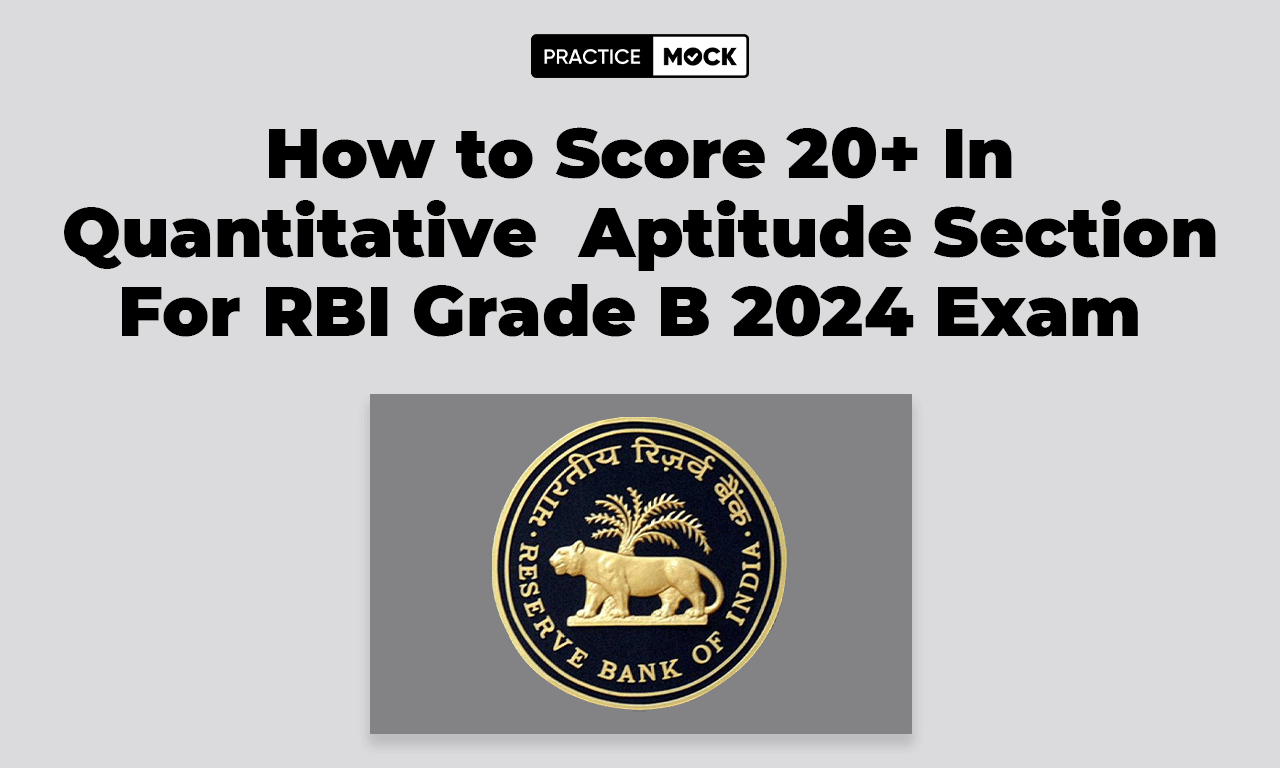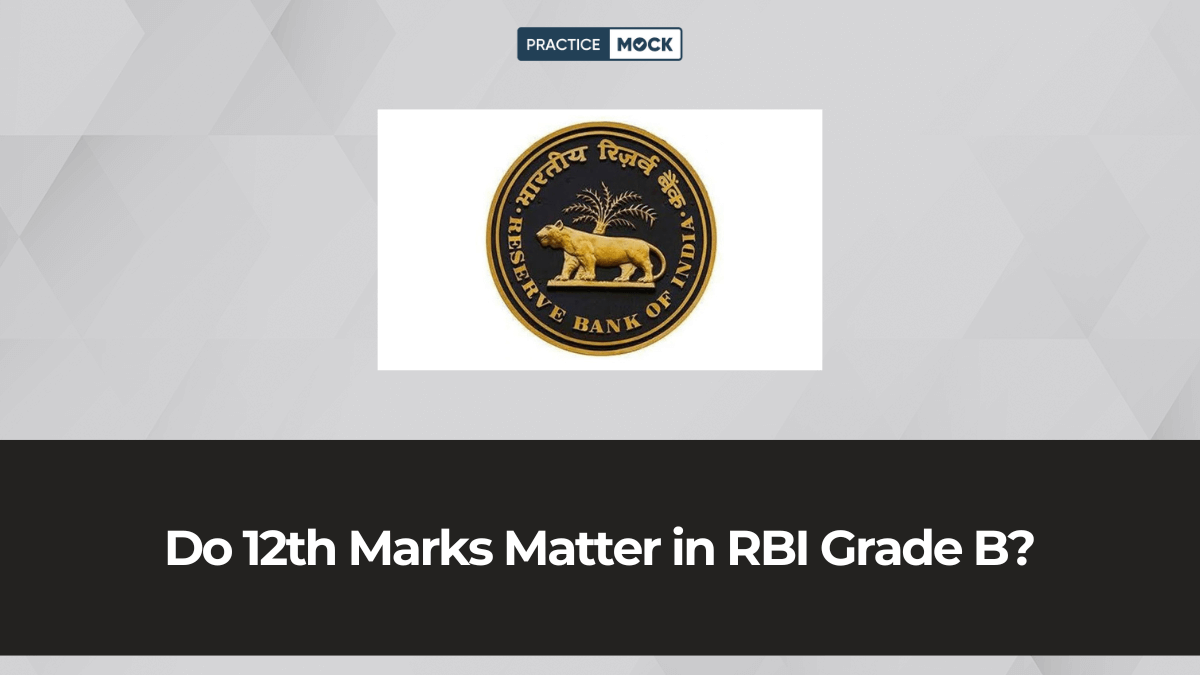How to Score 20+ Marks in Quantitative Aptitude Section for RBI Grade B 2024 Exam


The Quantitative Aptitude section can be tough, especially for those candidates who are scared of calculating! But with the right approach and consistent practice, even they can easily score 25+ marks out of a total of 30. The RBI Grade B Phase 1 exam is fast approaching, scheduled for September 8, 2024. Only a few days to go. Therefore, you need to follow a good strategy to achieve this aim. In this blog, we will reflect on the tips to score 25 + marks in the Quantitative Aptitude section.
Topic-Wise Tips to Score 20+ Marks in Quantitative Aptitude Section
Here are six important topics to focus on for scoring 20+ marks in the Quantitative Aptitude section for the RBI Grade B 2024 exam:
- Data Interpretation: This topic has tables, charts, and graphs. You need to master the art of dealing with percentages, ratios, and averages to increase your speed in solving DI questions.
- Simplification and Approximation: Master questions on addition, subtraction, multiplication and division and their short cuts. You should practice daily. It will improve your speed and accuracy in solving questions.
- Profit and Loss: Understand the basic equations involved in CP (cost price), SP (selling price), and discount to easily solve problems.
- Time and Work: Pay heed to Time, Work and Efficiency. Try out different variations such as pipes and cisterns to improve your speed of solving related problems.
- Time, Speed, and Distance: Some important topics to master in this part of the exam are relative speed, average speed, and basic formulae to speed up calculations. You should master questions related to trains, boats, and upstream-downstream.
- Simple and Compound Interest: Know the differences between calculations of simple and compound interest. you need to pay attention to understanding the main formulas and how they are related to each other.
Toppers Tips to Score 20+ Marks in Quantitative Aptitude Section for RBI Grade B 2024 Exam
It possible to score 20+ or full marks in Quantitative Aptitude Section for RBI Grade B 2024 Exam. Candidates should practice thoroughly and master all the most expected topics to make the most of this section. Follow the tips below to score more than the qualifying sectional cutoff score of the Quantitative Aptitude section.
Tip 1: Plan The Last Days of Preparation & Revision Smartly
There are just about 3 weeks left for the exam. Therefore, it’s necessary to have a well-designed study cum revision schedule for the Quantitative Aptitude section. Check out the table below to know how can fully utilize the remaining days:
| Week | Focus Areas | Key Activities |
| Week 1 (17th-22nd August): | Solidifying Main Concepts | – Revise key arithmetic topics (percentages, ratios, time & work, profit & loss). |
| – Practice 2-3 Data Interpretation (DI) sets daily (tabular, bar graph, pie chart). | ||
| – Improve calculation speed for simplification and approximation by mental practice. | ||
| – Identify number series patterns (simple to complex). | ||
| Week 2 (23rd-29th August): | More Practice and Mock Tests | – Focus on high-level DI and arithmetic questions. |
| – Take mock tests every alternate day – Analyze performance – Improve time management. | ||
| – Practice quadratic equations; revise permutations & combinations. | ||
| – Enhance speed in simplification and approximation problems. | ||
| Week 3 (30th August-7th September): | Revision and Final Strategy | – Prioritize revising key concepts and previously solved questions. |
| – Take 2-3 mock tests – Focus on time management and addressing weak areas. | ||
| – Avoid learning new topics – Practice DI tricks and improve arithmetic speed. |
Tip 2: Mock Tests and Time Management
Practice through RBI Grade B Phase 1 mock tests. It is essential in the last phase of preparation.
- Train with Exam Conditions Similar to the Real Exam: Solve previous years papers or mock tests in an environment as near to the actual examination as possible. This will help you manage your time and develop a feeling to cope with the pressure or stress that comes with the exam.
- Measure Your Performance & Improve: When you are finished with any test, take time, go through your errors, and write down your weak areas. Concentrate on quantity instead of quality to get the best results because one mistake is enough to bring down a comprehensive test score.
- Develop the Best Exam Strategy: How you would want to proceed for the actual examination? For example, one can solve the questions starting with the most comfortable ones and moving through the more difficult ones. In cases where you need to spread your attention, do so in proportion to your strength.
Here’s the table below to use the above-discussed points effectively:
| Key Action | Description | Purpose/Benefit |
| Simulate Exam Conditions | Take mock tests in a quiet environment similar to the real exam setting. | -Improves your time management skills -Reduces stress |
| Analyze Your Performance | -Review your mistakes -Find your weak areas for improvement. | -Improves accuracy. -Helps target problem areas |
| Develop an Exam Strategy | -Plan your test approach -Start with easier questions -Gradually tackling tougher ones. | -Optimizes time allocation -Maximizes overall score |
Tip 3: Master Most-Scoring Topics
This needs to be practiced since they have come with high weightage and normally repeated data interpretation (DI), simplification, and number series. To strengthen the basics, students should solve questions very often on different question types on these topics and aim to be as swift and error-free as possible.
Tip 4: Take RBI Grade B Phase 1 Mock Tests and Learn from Mock Test Analysis
Spend one full-length mock test in a day so as to get familiar with test pattern and time constraints. It is important to devote time to go through your mistakes during each test and find out where one went wrong. Concern about avoiding as many silly mistakes as possible and even improving on time management.
Tip 5: Practice the Art of Quick Calculation
More so in the quant section, always seek to work with speed, you can do simple calculations such as simplification and approximations mentally. Take time to learn short cuts tricks and approximation of various calculations that will enable you to dedicate more time to other questions.
Conclusion
Scoring 25+ in the Quantitative Aptitude section of the RBI Grade B Phase 1 exam is an achievable task. But only if you focus on practice and prepare strategically. You should concentrate on high-scoring topics like DI, arithmetic, and simplification in these last few days. Also, take the latest RBI Grade B 2024 mock tests and work hard on your speed and accuracy. You’ll be well-prepared to score 20+ Marks in the Quantitative Aptitude section and boost your overall score by following this systematic approach discussed above.
How to Score 20+ Marks in Quantitative Aptitude Section for RBI Grade B 2024 Exam FAQs
Regular practice and focusing on high-weightage topics like DI, simplification, and arithmetic are key.
Focus on Data Interpretation, simplification, number series, profit & loss, time & work, and interest calculations.
Mock tests help build time management skills, reduce stress, and improve accuracy.
Prioritize key concepts, practice mock tests, and focus on improving weak areas.
Start with easier questions and gradually move on to tougher ones while managing time effectively.
Practice mental calculations, learn shortcuts, and work on simplification and approximation techniques.
Recent Posts
Expected Puzzle Questions for RRB PO 2025, Check Tips to Solve Them Easily
In this article we are providing the Expected Puzzle Questions for RRB PO 2025. Candidates…
IDBI JAM 2025 Preparation Resources, Attempt Topic Wise Tests & Mock Tests
In this article we are providing the IDBI JAM 2025 Free preparation resources, Candidates can…
IBPS PO 2025 Notification in August, PO Exam Date Out, Check All Detailes
The IBPS PO 2025 Notification is expected to be released in August 2025. The Probationary…
Why Regular Mock Tests Are Important for IBPS PO Exam 2025 Success
Want to crack IBPS PO 2025? Mock tests help you analyze progress, improve strategy, and…
100+ Most Repeated Quadratic Equations Questions for RRB PO, Know Tips To Solve Easily
Here we provide 100 + Most Repeated Quadratic Equations Questions For IBPS RRB PO 2025…
SSC CGL 2025 Notification Will Out On 9th June, Check Exam Dates
The SSC will release the SSC CGL 2025 Notification on 9th June 2025. Check SSC…



